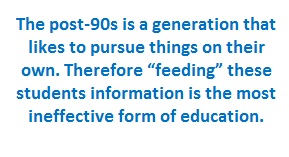Why the turnover rate of graduates remains high
By Robert Parkinson, CEO & Founder of RMG Selection
 June is the month when graduates officially leave school and start their professional life. Every year, almost every company launches campus recruitment campaigns, investing a lot of manpower and material resources. It is a campaign that takes more than six months to complete. However, the result after such hard work does not turn out to be very satisfying. Compared to experienced employees, the turnover rate of newly hired graduates is much higher. According to the Employee Turnover and Salary Adjustment Report 2015, released by a job website, in 2014, the turnover rate of graduates was 22.4 percent, much higher than the average employee turnover rate of17.4 percent. In other words, one out of every five graduates quit their job within about three months.
June is the month when graduates officially leave school and start their professional life. Every year, almost every company launches campus recruitment campaigns, investing a lot of manpower and material resources. It is a campaign that takes more than six months to complete. However, the result after such hard work does not turn out to be very satisfying. Compared to experienced employees, the turnover rate of newly hired graduates is much higher. According to the Employee Turnover and Salary Adjustment Report 2015, released by a job website, in 2014, the turnover rate of graduates was 22.4 percent, much higher than the average employee turnover rate of17.4 percent. In other words, one out of every five graduates quit their job within about three months.
HR managers rack their brains trying to pick out the right people during campus recruitment. Not only written tests, but also various kinds of interviews are used to assess candidates. So why is the graduate turnover rate so high?
According to a recent survey, 88 percent of the college students who quit their job do it voluntarily, less than 2 percent are actually fired. 31 percent leave due to insufficient development space, 25 percent over a low salary package and13 percent for the desire to change disciplines or sectors. . By investigating these causes, we can take action in recruitment and training to overcome the constant high graduate turnover rate.
 Unrealistic understanding of professional life
Unrealistic understanding of professional life
Bright prospects of the offered positions, strong company brands, comfortable working environment and competitive salary package, etc may create unrealistic expectations of what life at work will be like for new graduates. In fact, repetitive and preliminary tasks make up the majority of a graduate's daily work. Only by getting through this initial phase dopositions and better prospects begin to open up. Unfortunately a lot of graduates fall at the first hurdle. If companies fully explain the worst case scenario to students from the outset then there would be fewer graduates who quit their jobs in the short term. This is because doing so won't raise already high expectations, and therefore won't lead to such drastic disappointment. Although some students may choose not to apply for such positions, these people are exactly those who would quit their job within half a year.
Blind choice under pressure
Most universities in China are evaluated by employment rate. So when students hesitate when presented with an unsatisfying job offer, teachers from the school career centre tend to advise them the"job first, career choice second." Parents also don't want to see their children face unemployment upon graduation, and so often suggest they find a job before graduation. Under pressure from both school and family, chances are that students make a blind choice without considering the possible consequences. Companies hope to pick out outstanding talent through campus recruitment, but it is of equal importance to investigate the graduate's motivation and to find out whether their vision is in line with the company's development.
 Lack of appropriate guidance after employment
Lack of appropriate guidance after employment
Orientation for new employees is receiving more and more attention from companies. The main content tends to centre around two key points, namely, business and enterprise. Specifically, business process, products, company culture, rules and regulations are all included in the orientation. For graduates, these are important but not what they lack most. The biggest challenge for them is the shift in identity. Understanding what is work and what is the connection between work and employees should be given top priority. 'Work' here is not limited to current business, one is responsible for. Instead it refers to the entire work through one's career development. The post-90s is a generation that likes to pursue things on their own. Therefore "feeding" these students information is the most ineffective form of education. Motivation inspired by self-pursuit is stronger than any other kind. Employers should arrange well-known, competent and charming employees to communicate with graduates, letting them play the role of "mentor" who leads the way for the starters.
To recruit, employ and train a university student costs a company significant manpower and material resources. If graduates leave their positions, then a company's regular production and operation procedures are bound to be affected. Of course, the cost on the appointed graduate is a waste.
Try to resolve the problem so that every graduate that walks through the doors is likely to become a mainstay for your company for years to come!
--END--